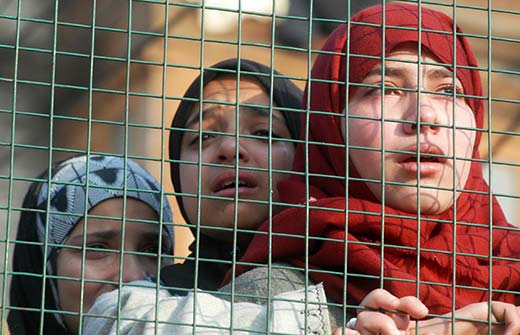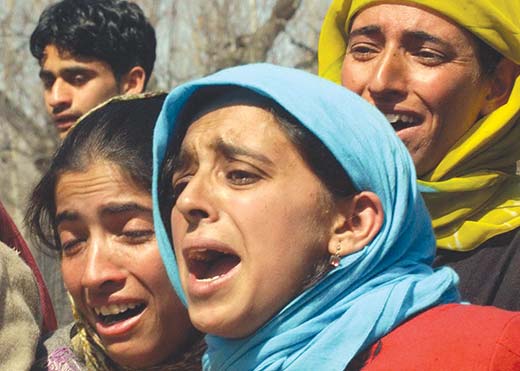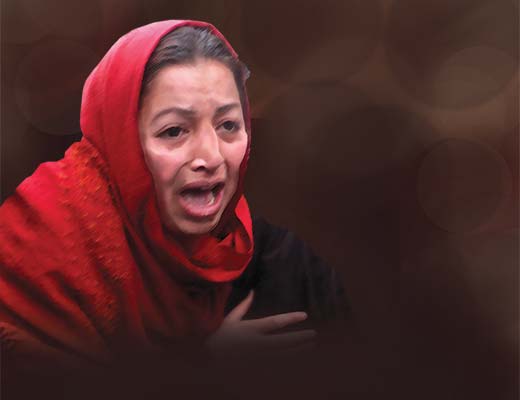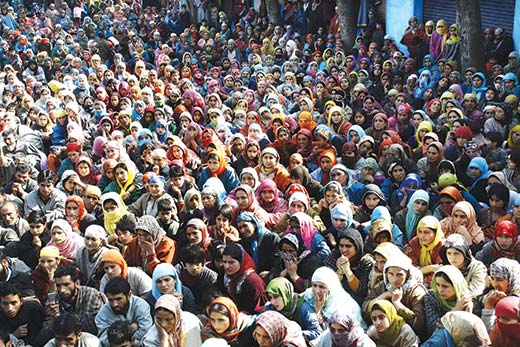Be it workplace harassment, eve-teasing, indecent gestures at places of study, or violence at home, women live through unending nightmare in a ‘man’s world’. Syed Asma reports the challenging life of woman in a Muslim society which is beyond the ‘discrimination’, the ‘emancipated’ talk about
Inside a jam-packed bus, a school going student, barely in her teens, was standing near the door trying not to fall. From the back end of the packed bus, a male passenger, who was in his early 50’s, called the little girl, “It doesn’t look good if a girl is standing near the door.” He then made some room near him and said, “Come…come and stand here.”
Almost everyone in the bus backed this elderly man and advised the little girl to come inside. The little girl obeyed dutifully and stood uncomfortably in the alley next to the elderly man.
But after a few minutes, as the bus stopped near a residential colony to let passengers deboard, the little girl almost jumped out, angrily. She had one of those hateful expressions on her face that puzzled everyone in the bus. People around could see her eyes filled with tears and her small cheeks turned red with rage. But before anybody could have asked anything she was out of the bus.
As the bus moved on, the elderly person who had offered little girl ‘breathing space’ next to him was now seated.
Mehru, a university student who was travelling in the same bus managed a seat next to the same elderly man.
All of a sudden Mehru slapped the elderly sitting next to her. There was a complete silence in the bus as nobody understood what has happened. “Get out of the bus or I will throw you out,” Mehru shouted at him. “This man is trying to take advantage of the situation,” said Mehru loudly addressing nobody in particular. “You know why that little girl rushed out of the bus angrily?” said Mehru. “He tried to molest her too,” she said raising her voice a bit higher expecting immediate reaction from the fellow passengers.
But to her dismay nobody said anything. “They all looked at me like fools. As if I was an alien and addressing rocks!” says Mehru angrily as she recalls the incident.
There was another elderly person sitting a few rows behind Mehru who finally spoke. “A girl should not be vocal about these matters,” he advised Mehru.

“It hurt me more than anything else. He was trying to patronise me by shifting the blame on me for speaking out against the perpetrator,” says Mehru.
Mehru looked straight into his eyes and told him to shut up or get the hell out of bus. “This man (pointing to the man sitting next to her) just tried to molest two girls, including a little girl and you are telling me to keep quite. You should have stoned him to death!” shouted Mehru at the passengers. “What kind of a society we live in!” Mehru asked angrily.
This is not an isolated incident where a girl is made to feel insecure. Mehru was bold enough to confront her perpetrator but there are cases, mostly unreported, where girls end up being victims.
Mehru’s friend Rifat, a university student, feels that women are no more safe in Kashmir as their counterparts (males) do not spare even elderly women when it comes to harassment.
“We have to face such situations day in a day out. A girl is not safe even inside an education institute,” says Rifat. “You can’t imagine what kind of favours teachers and professors ask from their girl students! It is disgusting and cheap,” claims Rifat. “It depends on a girl, how much she can resist. Some do, some don’t but a few succumb to pressure,” says Rifat.
There have been incidents where teachers, lecturers and even professors were involved in cases related to harassment of girl students. But most of these cases go unreported as students often fear for their careers. Then there are social stigma attached to such incidents that corners a victim rather than punishing the perpetrator.
This reporter came across one such unreported case where a mathematics teacher from government school Pulwama asked for sexual favours from his girl students promising them higher grades in examination.
“I was confused when I got less than expected marks in my maths paper. I requested my teacher to please re-check my answer sheet,” Rabia, who studies in 8th standard told Kashmir Life.
Without batting an eyelid the teacher told Rabia, “I know you deserve more than what you have got. I will recheck your paper but you have to give me whatever I ask.”
Rabia who had never come across such an awkward situation before could not react immediately. “But when I realised his intentions, I hit him back and ran away,” says Rabia, forcing each word out with difficulty.
Rabia did not attend school for next few days. She could not tell her parents either. “They will not understand, instead they would have blame me for it,” says Rabia. “I am waiting for my final exams to be over so that I don’t have to see his (maths teacher’s) face again,” says Rabia.
But not everybody is as fortunate as Rabia.
 In south Kashmir’s Kulgam district a 12-year-old girl was raped by her teacher inside the school premises. As per the police records, the teacher, Fayaz Ahmad Raina, had taken the minor in an empty class room and shared luring video from his mobile.
In south Kashmir’s Kulgam district a 12-year-old girl was raped by her teacher inside the school premises. As per the police records, the teacher, Fayaz Ahmad Raina, had taken the minor in an empty class room and shared luring video from his mobile.
After raping her, he left her unconscious in the classroom until a few students noticed her there and called for help.
Raina fled from the school but was later arrested by the local police. The family members of the victim lodged a complaint with the police who registered a rape case against Raina.
In another incident, a 12-year-old girl student was allegedly raped by her 60-year-old tuition teacher in Pantha Chowk in Srinagar outskirts.
But the most shocking of all the reported cases was rape of a 3-year-old girl child by a youth in South Kashmir. The incident happened when the girl’s mother had gone out to fetch water from a nearby stream.
The official data shows that the frequency of the rapes has increased over the years (Table 1).
“Harassment, molestation and rapes existed in the past as well but now they are more often registered with the police and in the courts and hence reported,” says Habeel Iqbal, a practicing lawyer.
But the number of cases reported across Kashmir are still less. Most of the cases remain unreported because of the stigma associated. Even if the parents are aware they choose to cover it up and live a ‘respectable’ life.
A similar ‘respectable’ life was lived by Rafia. It was 1999 when Rafia’s husband passed away. They had a daughter Hina who was then 3 year old. Rafia chose to remarry but was asked to leave Hina, which wasn’t acceptable to her. After a few years Rafia’s sister-in-law fell ill and passed away. Her parents decided to get Rafia married to her brother-in-law. Hina was then 7 year old. Since then her uncle, now her step father, sexual exploited her. Hina complained it to her mother but she told her that if she (Hina) does not compromise, her step-father would divorce Rafia and they will have to live as destitute.
For many years, Hina compromised but then one day she died after coming under a truck. Many say it was an accident and many believe it was a suicide.
Nighat Shafi Pandit, a social activist says that in most of the women exploitation cases another woman is the reason – in one way or the other.
“It is always another woman who lets u down,” she opines, “We (women) should understand that unless we don’t stand up against the violence, no one will bother to help us. Why are we waiting that men will give us our rights on a platter? We need to fight for it.”
Renowned sociologist Bashir Ahmad Dabla’s works also reflects the same, “violence against women is not only inter-gender in nature but is intra-gender as well which suggests that violence is committed against women not only by men but by women too.”
In 2011, Shazia Majeed, a librarian at Islamic University of Science and Technology, Awantipora was found hanging at her home. She was survived by her husband and a son. Shazia, a topper from Kashmir University, got married a few years ago but her father says she was not happy as her husband constantly forced her to bring more money from her parents. He wanted to build a separate house for himself.
Shazia’s father says his daughter was murdered by her husband. “She was a victim of dowry and domestic violence.”
There are many such cases where victims end up losing their lives like Shazia. “This happens because we live in a confused society,” says Pandit. “Most of our men are confused. They reject non-working girls and choose working women instead, but at the same time cannot tolerate if their office going wife comes home late in the evening,” says Pandit.
“So a woman becomes a punching bag. She earns for the family like her husband and but at the same time has to take care of the family as a home-maker. A husband fails to understand that if his wife is sharing his burden by earning, he too has some responsibilities towards rearing children and other things,” says Pandit. “A woman must know to fight for her rights. That is the only way out of this mess,” feels Pandit.
Hafeeza Muzaffar, ex-member secretary, State Commission for Women (SCW) believes domestic violence always existed in Kashmir; the only difference is that now it is documented. She says she has seen violence in every sector of society against women who work, and those who are homemakers as well.
Haleema, a gazetted officer, has an interesting story to share. Her husband is an (gazetted) officer too.
Haleema was married at the age of 19 and had two daughters by the time she turned 23. “I had to suffer a lot as my husband and in-laws were cruel. But I managed to survive,” says Haleema.
After marriage Haleema continued her studies and graduated. She worked hard and cracked a competitive exam which put her at par with her government servant husband. They both drew more or less the same salary and had same status.
“Things changed completely after the exams. It gave self confidence. I don’t think you would believe but after that I once slapped my husband back and since then he has not even shouted at me. I know I did wrong but he wasn’t doing the right thing either. Every night he used to beat me and my daughters. I had to do it for myself and for my two daughters,” says Haleema.
Sociologists believe that violence against women is increasing because of increasing materialistic outlook in the society, prevalence of pre-marital and extra-marital affairs, extravagant marriages and sudden exposure to mass media.
Violence is not prevalent only in homes but at work places too. Harassment at work places is also a graving concern.
Farhat, a contractual employee in one of the reputed institutions of the Valley has filed a case of harassment against one of her senior colleagues. Though due to various pressures she had to withdraw the case but the accused was transferred to Kargil as a punishment.
“He judged me on my appearance and asked for the favours I cannot even dream of,” says an anguished Farhat. “Wearing vibrant colours and not covering my head does not make me a prostitute,” says Farhat.
“We live in a sick society dominated by men,” she says.
Experts believe that men exploit the system as there are no rules that safeguard a women’s dignity at a workplace.
Pandit says we have laws for every crime but the way they are implemented needs to be looked into!
Note: Some names have been changed to protect the identity of victims.



















I can feel the situations a women has to face in a male dominated society and I agree hundred percent with all the situations you have mentioned. But,
Fact of the matter is that women have desecrated their sanctity in this society by adopting to the western culture, imitation of actresses etc.
In fact women, as per Islamic Rule were required to remain inhouse most of the time and they are not allowed to go for a journey without a “Moharam”.
I may quote a Hadith where it has been told by the Prophet (SAW) that women will come out of their home with perfumes sprayed on them who will attract males towards them and I see the Hadith proving in our society wherein the scourge of westerization has invaded. Our daughters, sisters, mothers have fallen pray to these things and as such we cannot blame only men for the heinous crimes that has overwhelmed our lives.
I totally disagree with above comments .
As per the above Data on women crimes and harassment, women infact minors were from villages and there are not aware of western culture. Crime rate in urban is area is less and women are vocal even though they are inclined towards westernization and fashion culture. Irrespective of gender if we are social ,inclined towards God we will never do such an deed.
Blaming the Girls/women is not correct.
Sad to read all this ..But again How can you blame girls for this inhumane savage behavior by their male counterparts. Kashmir has become a breeding ground for such animals.. The problem is much bigger than this and needs immediate redressal. Anyway nicely written and quite informative!
Thanks to the author for such detailed work…
Heart wrenching and ugly truth of our society…
Agreeing with Harvinder, blaming western culture has nothing to do with what is happening around us. We should stop projecting our criminal tendencies on the West. Please focusing on the real issue.
We (as father, mother, sister, brother or friend) must encourage and support females to voice out against any kind of harassment.
To males exclusively: Problem is with us not them. So, please stop finding excuses for being monsters & molesters.
P.S: If we really want to bring the change, we must start to act.
Well this is one of the biggest problems of our society and it needs to be solved. But where is the solution? Is it with the our men or women? Or is it with the both ?
The problem is no one is ready to take any step.
Men say that why should we take any steps in this matter when its the problem of women and women on the other hand say why should we take any steps, why cant they control themselves, its their problem. And the results are prevelent.
If we try to realize, we hardly hear that a girl in hijab(with the headcover and the veil) was harrased. And normally most of the men respect such women. But most of the men do not have respect for a girl who is not in hijab. A girl who wears tempting clothes and makeup on her face is not respected by most of our men and is usually a target for those who are always waiting to tease and harass a girl.
So this is a problem of the both and the solution of the problem is with the both. And there will never be a solution of this problem without proper mutual considerations.
Men should be advised not to do any kind of harm to a woman. And similarly women should be advised not to do any harm to a man. The harm of a man is quite apparent but the harm of a woman is of higher priorty here that includes her dress and her attitude with the men in major.
As the sister farhat has said:
“He judged me on my appearance and asked for the favours I cannot even dream of,”.
“Wearing vibrant colours and not covering my head does not make me a prostitute,”
But dear sister, had you made an effort to cover yourself in a better way maybe he could’ve never asked anything of such kind from you. His act is punishable and as you said he has been punished and maybe that was not enough but you as well need to ask yourself, was there some guilt from your side too? Had it just been a pinch of guilt. Was there something you could’ve done to save him from doing such a shameful act and save yourself from sucha moment? There were things in your hands too.
We see when a doctor treats a patient, he does not only give him medicines but he also prevents the patient from certain things(usualy eatables) so that the disease he’s curing may not attack him again. Same is the case here. We need to cure this disease, so we advise our brothers to be in hijab as your lord has ordered you to be and not to do such immoral acts and punish them if they do and we also advise our sisters to be in hijab as your lord has ordered you to be and not to tempt men by wearing tempting clothes or immoral makeup.
Allaah says (interpretation of the meaning): “O Prophet! Tell your wives and your daughters and the women of the believers to draw their cloaks (veils) all over their bodies (i.e. screen themselves completely except the eyes to see the way). That will be better, that they should be known (as free respectable women) so as not to be annoyed. And Allaah is Ever Oft‑Forgiving, Most Merciful”
[al-Ahzaab 33:59]
Our Prophet (blessings and peace of Allah be upon him) said: “Any woman who puts on perfume and passes by people so that they can smell her fragrance is a zaaniyah.”